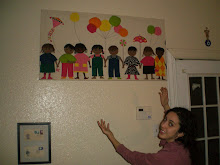On the bus (wow, every story I tell begins with that phrase), I often see women (they're always women) reading and chanting from a Bible-looking book of some sort of Jewish verses? It creeps me out. While I do not have a book of Jewish verses (or whatever that book is), I do carry my personal Bible with me: the autobiography Lost in Translation: Life in a New Language by Eva Hoffman. Praise it.
The Book tells Eva's story as a young daughter of Holocaust survivors in post-WWII Cracow, Poland. It then goes on to tell the story of her life from the lens of her immigration. When Eva was 13, she moved to vancouver with her family. She later went to Rice University in Houston, and way later went to Harvard for grad school (studied literature, obvi). She then lived in NYC for a while, and I hear that now she lives in London.
I first read Lost in Translation in my Lit of Exile class my sophomore year. I was especially obnoxious in that class and would get mad whenever my bright-eyed, bushy-tailed freshmen classmates would say anything too annoyingly American. I'm sure a few people in that class hated me.
I took the class because the syllabus featured The Unbearable Lightness of Being, which was my fave book before LiT came along (yes, I was a stereotypical 18-year-old who loved Milan Kundera and esp. Karenin the dog, shuttup). But then I read LiT and Kundera didn't stand a chance.
While reading LiT, I would often go back to my journals and find passages that described exact experiences to Eva Hoffman's (much less eloquently written, natch). I felt like for the first time in my life, I was finally reading the story of someone who was a lot like me. No other book before or since describes so completely the vertigo of immigration. Immigrant writers usually skip over the specific weakness and alienation they feel, though it often seeps into their work in more indirect ways. Eva just deals with it head-on.
And finally, a female character I could relate to. This is the Holy Grail for those of us caught Reading While Penis-less (RWP is a great offense to most authors, you see).
I relate to so many aspects of Eva, but most of all, I relate to her bitchiness and cattiness toward people.
Exhibit A, P. 203: "In the conversation of my friends, I sniff out cultural cliches like a hound on the scent of hostile quarry. An innocent remark like 'Well, I don't know what to tell you, it really depends on how you feel' provokes in me the most bitter reflections on American individualism, and how a laissez-faire tolerance can mask a callous indifference."
Sing it, sister.
These days, I'm concerned, because mine and Eva's paths have diverged. She continued living in the US after college/grad school. I, on the other hand, moved back to my pre-teen homeland, am not in grad school at all, and have no direction for my life. The last pages of her book are even more poignant to me now that I'm no longer in the States:
"As long as the world around me has been new each time, it has not become my world; I lived with my teeth clenched against the next assault of the unfamiliar. But now, the year has assumed an understandable sequence within which I play the variations of a professional New York life. The social world in which I move has comprehensible elements and dimensions. I am no longer mystified by the rules and rituals of friendship and love . . . Pattern is the soil of significance; and it is surely one of the hazards of emigration, and exile, and extreme mobility, that one is uprooted from that soil."
Waaaah. As a person who is still mystified by the rules of friendship and love, and who constantly uproots myself from my soil, I am so jeal. I want so badly for my life to finally become familiar and orderly instead of being so full of strangeness. I want to master Hebrew like Eva mastered English. Actually, I'd like to master both Hebrew and English, if possible. I want her success, her pride, and her ability to be so sure of herself.
For a while in college, I assumed that just like Eva, I'd go on to graduate school in literature, and then get married and divorced and have no kids. I almost saw the book as some sort of prophecy for my life--a prophecy I was a little scared of, to be honest. But now, the book is becoming less and less relatable. I can't fit my experiences into the schema of assimilating into US culture and mastering it. Instead, I'm in this mindfuck of trying to fit into my home-yet-not-home land while also trying to maintain my assimilation skillz of yesteryear. I'm trying to be Nabokov when I could just as well end up a boring cultureless loser.
So here I am, mourning my Bible's status as the book of my heart. No matter, I'm sure another one will come along soon enough.
Subscribe to:
Post Comments (Atom)

I bought that book for a class I never took (Wolitz!), so I never actually read it. I'll have to pick it back up.
ReplyDeleteAnd yeah, betrayal of/by the books we define ourselves by. . . I guess I'm just as afraid I'll live up to some of them. Angst, May!
I want to read this book now, especially since immigration is important to me academically and personally! It makes me wonder how I will feel about immigration. I'm not sure it will change my views that I might never "fit into" society. I am not sure how much anyone really can, or whether it's even worth it.
ReplyDeleteThanks for such an interesting entry!
Wow, amazing post! I MUST read this book.
ReplyDelete